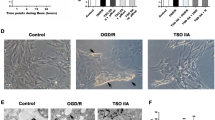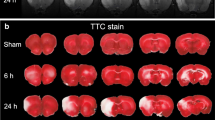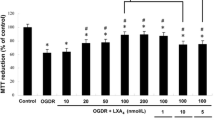Abstract
Previous studies have suggested that progesterone may be involved in neuroprotection by preventing brain edema. In this study, we assessed the effects of progesterone on aquaporin-4 (AQP4) expression in an ischemia/reperfusion model of cultured rat astrocytes, and further explored the possible role of the protein kinase C (PKC) pathway in this course. We evaluate primary culture astrocytes exposed to 4 h oxygen–glucose deprivation (OGD) followed by 24 h reperfusion (OGD4h/R24h) as a means of simulating cortex ischemia and reperfusion, and test the effect of progesterone on AQP4 expression in response to OGD4h/R24h. Besides, the cell viability was assessed by MTT reduction and lactate dehydrogenase release assay, accompanied by cell morphology survey. At a concentration of 1 and 2 μM, progesterone significantly attenuated AQP4 at the level of both protein and mRNA and ameliorated the cell viability of astrocytes from OGD/reperfusion injury. Moreover, this effect was blocked by the PKC inhibitor Ro31-8220, which was employed before the OGD. These results indicate that progesterone exerts the protective effects and attenuates AQP4 expression in an astrocyte model of ischemia/reperfusion depending on the PKC signal pathway.








Similar content being viewed by others
References
Badaut J, Ashwal S, Obenaus A (2011) Aquaporins in cerebrovascular disease: a target for treatment of brain edema? Cerebrovasc Dis 31:521–531. doi:10.1159/000324328
Unterberg AW, Stover J, Kress B, Kiening KL (2004) Edema and brain trauma. Neuroscience 129:1021–1029. doi:10.1016/j.neuroscience.2004.06.046
Verkman AS (2011) Aquaporins at a glance. J Cell Sci 124:2107–2112. doi:10.1242/jcs.079467
Zador Z, Stiver S, Wang V, Manley GT (2009) Role of aquaporin-4 in cerebral edema and stroke. Handb Exp Pharmacol 190:159–170. doi:10.1007/978-3-540-79885-9_7
Manley GT, Fujimura M, Ma T, Noshita N, Filiz F, Bollen AW, Chan P, Verkman AS (2000) Aquaporin-4 deletion in mice reduces brain edema after acute water intoxication and ischemic stroke. Nat Med 6:159–163. doi:10.1038/72256
Ribeiro Mde C, Hirt L, Bogousslavsky J, Regli L, Badaut J (2006) Time course of aquaporin expression after transient focal cerebral ischemia in mice. J Neurosci Res 83:1231–1240. doi:10.1002/jnr.20819
Taniguchi M, Yamashita T, Kumura E, Tamatani M, Kobayashi A, Yokawa T, Maruno M, Kato A, Ohnishi T, Kohmura E, Tohyama M, Yoshimine T (2000) Induction of aquaporin-4 water channel mRNA after focal cerebral ischemia in rat. Brain Res Mol Brain Res 78:131–137. doi:10.1016/S0169-328X(00)00084-X
Papadopoulos MC, Verkman AS (2005) Aquaporin-4 gene disruption in mice reduces brain swelling and mortality in pneumococcal meningitis. J Biol Chem 280:13906–13912. doi:10.1074/jbc.M413627200
Han Z, Wax MB, Patil RV (1998) Regulation of aquaporin-4 water channels by phorbol ester-dependent protein phosphorylation. J Biol Chem 273:6001–6004. doi:10.1074/jbc.273.11.6001
Zelenina M, Zelenin S, Bondar AA, Brismar H, Aperia A (2002) Water permeability of aquaporin-4 is decreased by protein kinase C and dopamine. Am J Physiol Renal Physiol 283:F309–F318. doi:10.1152/ajprenal.00260.2001
Fazzina G, Amorini AM, Marmarou CR, Fukui S, Okuno K, Dunbar JG, Glisson R, Marmarou A, Kleindienst A (2010) The protein kinase C activator phorbol myristate acetate decreases brain edema by aquaporin 4 downregulation after middle cerebral artery occlusion in the rat. J Neurotrauma 27:453–461. doi:10.1089/neu.2008.0782
Karasu A, Aras Y, Sabancı PA, Sağlam G, Izgi N, Biltekin B, Barak T, Hepgül KT, Kaya M, Bilir A (2010) The effects of protein kinase C activator phorbol dibutyrate on traumatic brain edema and aquaporin-4 expression. Ulus Travma Acil Cerrahi Derg 16:390–394
He L, Yang H, Zhai LD, Shao H, Li YS (2011) A preliminary study on progesterone antioxidation in promoting learning and memory of young ovariectomized mice. Arch Med Sci 7:397–404. doi:10.5114/aoms.2011.23402
Sayeed I, Stein DG (2009) Progesterone as a neuroprotective factor in traumatic and ischemic brain injury. Prog Brain Res 175:219–237. doi:10.1016/S0079-6123(09)17515-5
Murphy SJ, Littleton-Kearney MT, Hurn PD (2002) Progesterone administration during reperfusion, but not preischemia alone, reduces injury in ovariectomized rats. J Cereb Blood Flow Metab 22:1181–1188. doi:10.1097/01.WCB.0000037990.07114.07
Gibson CL, Murphy SP (2004) Progesterone enhances functional recovery after middle cerebral artery occlusion in male mice. J Cereb Blood Flow Metab 24:805–813. doi:10.1097/01.WCB.0000125365.83980.00
Ishrat T, Sayeed I, Atif F, Hua F, Stein DG (2012) Progesterone is neuroprotective against ischemic brain injury through its effects on the phosphoinositide 3-kinase/protein kinase B signaling pathway. Neuroscience 210:442–450. doi:10.1016/j.neuroscience
Guo Q, Sayeed I, Baronne LM, Hoffman SW, Guennoun R, Stein DG (2006) Progesterone administration modulates AQP4 expression and edema after traumatic brain injury in male rats. Exp Neurol 198:469–478. doi:10.1016/j.expneurol.2005.12.013
Kimura I, Nakayama Y, Zhao Y, Konishi M, Itoh N (2013) Neurotrophic effects of neudesin in the central nervous system. Front Neurosci 7:111. doi:10.3389/fnins.2013.00111
Atif F, Sayeed I, Ishrat T, Stein DG (2009) Progesterone with vitamin D affords better neuroprotection against excitotoxicity in cultured cortical neurons than progesterone alone. Mol Med 15:328–336. doi:10.2119/molmed.2009.00016
Balasubramanian B, Portillo W, Reyna A, Chen JZ, Moore AN, Dash PK, Mani SK (2008) Nonclassical mechanisms of progesterone action in the brain: I. Protein kinase C activation in the hypothalamus of female rats. Endocrinology 149:5509–5517. doi:10.1210/en.2008-0712
Fu X, Li Q, Feng Z, Mu D (2007) The roles of aquaporin-4 in brain edema following neonatal hypoxia ischemia and reoxygenation in a cultured rat astrocyte model. Glia 55:935–941. doi:10.1002/glia.20515
Yamamoto N, Yoneda K, Asai K, Sobue K, Tada T, Fujita Y, Katsuya H, Fujita M, Aihara N, Mase M, Yamada K, Miura Y, Kato T (2001) Alterations in the expression of the AQP family in cultured rat astrocytes during hypoxia and reoxygenation. Brain Res Mol Brain Res 90:26–38. doi:10.1016/S0169-328X(01)00064-X
Zhu SM, Xiong XX, Zheng YY, Pan CF (2009) Propofol inhibits aquaporin 4 expression through a protein kinase C-dependent pathway in an astrocyte model of cerebral ischemia/reoxygenation. Anesth Analg 109:1493–1499. doi:10.1213/ANE.0b013e3181b893f3
McCarthy KD, de Vellis J (1980) Preparation of separate astroglial and oligodendroglial cell cultures from rat cerebral tissue. J Cell Biol 85:890–902. doi:10.1083/jcb.85.3.890
Kaur C, Sivakumar V, Zhang Y, Ling EA (2006) Hypoxia-induced astrocytic reaction and increased vascular permeability in the rat cerebellum. Glia 54:826–839. doi:10.1002/glia.20420
Lourhmati A, Buniatian GH, Paul C, Verleysdonk S, Buecheler R, Buadze M, Proksch B, Schwab M, Gleiter CH, Danielyan L (2013) Age-dependent astroglial vulnerability to hypoxia and glutamate: the role for erythropoietin. PLoS ONE 8:e77182. doi:10.1371/journal.pone.0077182
Saura J (2007) Microglial cells in astroglial cultures: a cautionary note. J Neuroinflammation 4:26. doi:10.1186/1742-2094-4-26
Liu M, Dziennis S, Hurn PD, Alkayed NJ (2009) Mechanisms of gender-linked ischemic brain injury. Restor Neurol Neurosci 27:163–179. doi:10.3233/RNN-2009-0467
Huang Q, Zhang R, Ly Z, Cao X, Chu X (2013) Cell death pathways in astrocytes with a modified model of oxygen–glucose deprivation. PLoS ONE 8:e61345. doi:10.1371/journal.pone.0061345
Yu AC, Wong HK, Yung HW, Lau LT (2001) Ischemia-induced apoptosis in primary cultures of astrocytes. Glia 35:121–130. doi:10.1002/glia.1077
Hirt L, Ternon B, Price M, Mastour N, Brunet JF, Badaut J (2009) Protective role of early aquaporin 4 induction against postischemic edema formation. J Cereb Blood Flow Metab 29:423–433. doi:10.1038/jcbfm.2008.133
Papadopoulos MC, Verkman AS (2007) Aquaporin-4 and brain edema. Pediatr Nephrol 22:778–784. doi:10.1007/s00467-006-0411-0
Wang J, Jiang C, Liu C, Li X, Chen N, Hao Y (2010) Neuroprotective effects of progesterone following stroke in aged rats. Behav Brain Res 209:119–122. doi:10.1016/j.bbr.2010.01.026
Jiang C, Wang J, Li X, Liu C, Chen N, Hao Y (2009) Progesterone exerts neuroprotective effects by inhibiting inflammatory response after stroke. Inflamm Res 58:619–624. doi:10.1007/s00011-009-0032-8
Ardeshiri A, Kelley MH, Korner IP, Hurn PD, Herson PS (2006) Mechanism of progesterone neuroprotection of rat cerebellar Purkinje cells following oxygen–glucose deprivation. Eur J Neurosci 24:2567–2574. doi:10.1111/j.1460-9568.2006.05142.x
Mani SK, Oyola MG (2012) Progesterone signaling mechanisms in brain and behavior. Front Endocrinol (Lausanne) 3:7. doi:10.3389/fendo.2012.00007
Louis JC, Magal E, Brixi A, Steinberg R, Yavin E, Vincendon G (1991) Reduction of protein kinase C activity in the adult rat brain following transient forebrain ischemia. Brain Res 541:171–174. doi:10.1016/0006-8993(91)91094-H
Luoma JI, Kelley BG, Mermelstein PG (2011) Progesterone inhibition of voltage-gated calcium channels is a potential neuroprotective mechanism against excitotoxicity. Steroids 76:845–855. doi:10.1016/j.steroids
Masliah E, Yoshida K, Shimohama S, Gage FH, Saitoh T (1991) Differential expression of protein kinase C isozymes in rat glial cell cultures. Brain Res 549:106–111. doi:10.1016/0006-8993(91)90605-U
Acknowledgments
We thank professor Wenyan Niu for her invaluable assistance with the astrocyte model of ischemia/reperfusion. This study was supported by the National Natural Science Foundation of China (no. 81200957) and the key research project fund of Tianjin Medical University (no. 052-200010).
Author information
Authors and Affiliations
Corresponding author
Electronic supplementary material
Rights and permissions
About this article
Cite this article
He, L., Zhang, X., Wei, X. et al. Progesterone Attenuates Aquaporin-4 Expression in an Astrocyte Model of Ischemia/Reperfusion. Neurochem Res 39, 2251–2261 (2014). https://doi.org/10.1007/s11064-014-1427-7
Received:
Revised:
Accepted:
Published:
Issue Date:
DOI: https://doi.org/10.1007/s11064-014-1427-7





